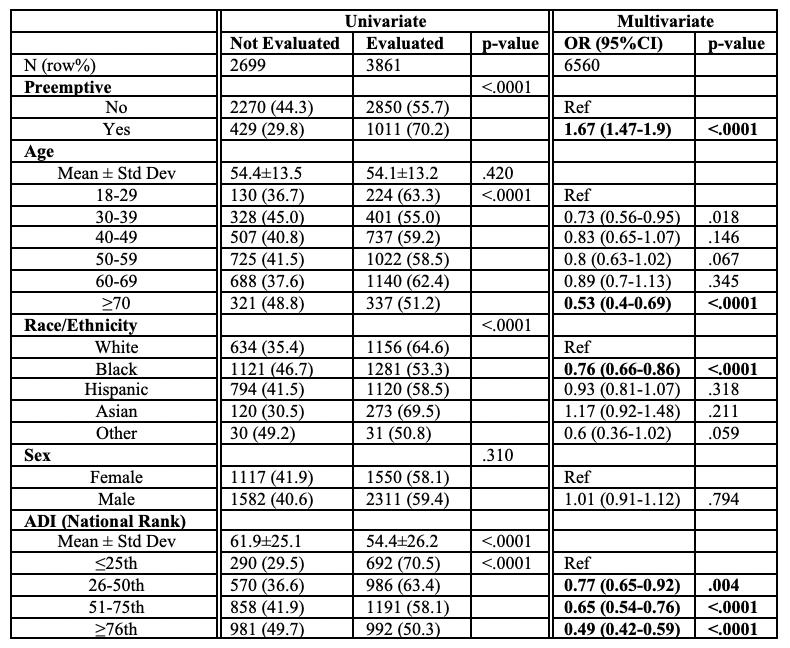Progression from Kidney Transplant Referral to Initiating the Pre-Transplant Evaluation: What Causes the Break Down?
Houston Methodist, Houston, TX
Meeting: 2022 American Transplant Congress
Abstract number: 1731
Keywords: Kidney, Kidney transplantation
Topic: Clinical Science » Kidney » 50 - Health Equity and Access
Session Information
Session Time: 7:00pm-8:00pm
 Presentation Time: 7:00pm-8:00pm
Presentation Time: 7:00pm-8:00pm
Location: Hynes Halls C & D
*Purpose: The transplant treatment pathway is marred by both socio-economic and racial/ethnic disparities at each stage of the process, which includes conversion from referral to the pre-transplant evaluation process. This study assesses factors predictive of progressing from referral to beginning the pre-transplant evaluation at a single center serving a racially and ethnically diverse urban population.
*Methods: This study used two SES models, one with the Area Deprivation Index (a scale of 1-100 with 100 showing higher disadvantage/low SES), and the other with patient-reported variables (e.g. income, employment, and education). Both models included preemptive status, age, race/ethnicity, sex, distance to center, payor at referral (primary and secondary), EPTS score, referral reason, body mass index (BMI), and smoking status. All patients referred to the transplant center from 6/1/2016 to 8/31/2021 for kidney transplant evaluation were included in the study population, excluding referrals after May 2021 and patients with missing requisite data. Progress through the pre-transplant evaluation was examined for patterns in waitlist approval using multivariate logistic regression, adjusting for demographic, SES, and clinical factors.
*Results: Age and BMI limits both showed statistically significant reduced likelihood in waitlisting approval. Male sex and higher education levels were predictive of an increased likelihood of waitlist approval. Preemptive status was associated with increased likelihood of waitlist approval, but race/ethnicity was not shown to be significant. Two other factors associated with decreased likelihood of waitlist approval were having Medicare coverage at referral, which could be related to patient age, and diabetes as a referral diagnosis.
*Conclusions: Prioritizing Black patients and patients in higher ADI quartiles (i.e., lower SES) for targeted educational interventions and support, specifically at this phase of the pre-transplant process, might help increase the conversion from referral to evaluation for these vulnerable populations. Black patients would particularly benefit from intervention as they are not only less likely to present preemptively but also less likely to begin the pre-transplant evaluation work-up.
To cite this abstract in AMA style:
Menser T, Hobeika MJ, Hsu E, Moore LW, Waterman AD, Gaber AO, Knight RJ. Progression from Kidney Transplant Referral to Initiating the Pre-Transplant Evaluation: What Causes the Break Down? [abstract]. Am J Transplant. 2022; 22 (suppl 3). https://atcmeetingabstracts.com/abstract/progression-from-kidney-transplant-referral-to-initiating-the-pre-transplant-evaluation-what-causes-the-break-down/. Accessed June 30, 2025.« Back to 2022 American Transplant Congress

